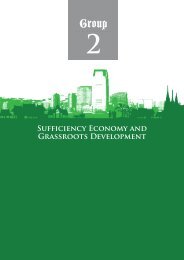Conflict, Legitimacy and Government Reform: Equitable Allocation of ...
Conflict, Legitimacy and Government Reform: Equitable Allocation of ...
Conflict, Legitimacy and Government Reform: Equitable Allocation of ...
You also want an ePaper? Increase the reach of your titles
YUMPU automatically turns print PDFs into web optimized ePapers that Google loves.
132 KPI Congress XI<br />
governments as it has always been used?” <strong>and</strong> “What recommendations<br />
should there be to promote the body <strong>of</strong> knowledge on “political<br />
legitimacy” to Thai people in a creative way that agrees with a national<br />
democratic government under constitutional monarchy <strong>and</strong> to help push<br />
Thai politics into a better direction. With these issues in mind, the<br />
writer conducted a literature review on various literature <strong>and</strong> researches<br />
to find answers for the aforementioned issues.<br />
The writer proposes a new perspective on political legitimacy in that<br />
it should broadly cover every sector <strong>and</strong> every part <strong>of</strong> the term “politics”.<br />
“Political legitimacy” should not be the term used only to stimulate<br />
creative political conscience with governments, but should also be used<br />
with the opposition, senators, judicial organizations, statutory free<br />
organizations, media, private development organizations, academic<br />
pr<strong>of</strong>essionals <strong>and</strong> society as individuals <strong>and</strong> other sectors raise the level <strong>of</strong><br />
“Thai political development” so political legitimacy genuinely occurs in<br />
terms <strong>of</strong> content <strong>and</strong> process which will eventually lead to desired<br />
political stability.<br />
Finally, the writer recommends that there be a process for<br />
promoting the body <strong>of</strong> knowledge on “political legitimacy” <strong>and</strong> other<br />
important bodies <strong>of</strong> knowledge such as overall bodies <strong>of</strong> knowledge on<br />
“politics” <strong>and</strong> on “democracy” to the public, who can be divided into 2<br />
major groups: 1. The youth studying from kindergarten to high school<br />
<strong>and</strong> those who are studying at the college level as well, <strong>and</strong> 2. The general<br />
public who has already left educational facilities since adolescence,<br />
middle age <strong>and</strong> senior adulthood.<br />
The writer believes that a clear <strong>and</strong> tangible method that can<br />
effectively create the aforementioned processes in the two sectors <strong>of</strong><br />
people is the creation <strong>of</strong> a curriculum <strong>of</strong> at least three years’ duration <strong>and</strong><br />
the process must not be thought by memorization, but it utilize “child<br />
centers”, “citizen dialogue” <strong>and</strong> “facilitators” as core processes because<br />
these bodies <strong>of</strong> knowledge are not about memorization, but they are<br />
about asking questions <strong>and</strong> collectively finding the answers wherein the<br />
facilitator is the one who gradually takes the two sectors <strong>of</strong> public toward<br />
the goal in order for the knowledge, realization, responsibility <strong>and</strong><br />
conscience <strong>of</strong> citizenship to occur genuinely.














